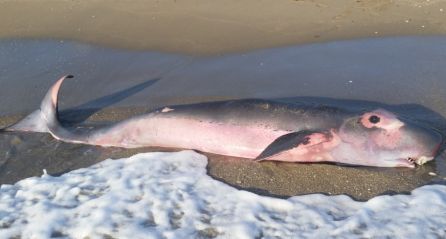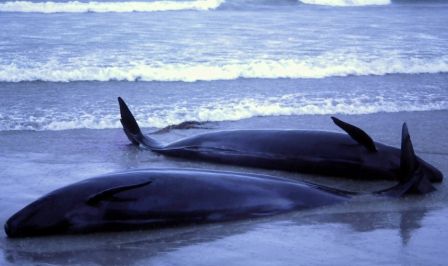
A large number of marine animals, including whales and dolphins, strand on beaches worldwide each year. Also known as beaching, this process is common in both healthy, as well as injured, marine animals. This also happens with the dead animals that are washed away by the winds. Sometimes even a large group of animals gather at one place, usually near the beach or shore of an island, which is called stranding.
Mainly, there are two types of standings, single stranding and multiple stranding.
Single Stranding: Whales do often come to the shore for the reasons being they are sick, old, injured or disoriented. Some strandings are human-caused because of the pollution created by humans by throwing unnecessary things into the sea, which suffocates marine life and thus, causes the stranding of animals.
Multiple Stranding: These strandings happen when a particular animal is leading the group “lead animal”. This only takes place when a group of animals living together. While moving from one position to another if any animal gets sick or injured, then this stranding takes place, which is very common amongst marine animals.
Sadly, thousands of dolphins and whales die across the globe every year. While most of the reasons for these deaths are natural, some deaths occur because of human activities. Once a marine animal is onshore, it would only survive for some hours if not taken care of.
Main Reasons Why Whales Beach Themselves
The following are some reasons why whales and other marine animals like dolphins beach themselves:
- Water Pollution:
Whales and other marine animals become sick and even die because of the pollutants available in the water. The increasing number of gases, toxins added to the sea is hazardous for marine life. We human beings play a major role in polluting water bodies, adding all the waste material, which is not fit for living beings. Once we dump the trash into the sea or oceans, it causes problems to marine life and is a reason for the beaching of whales.
- Natural Diseases:
Just as humans fall sick, so do the animals. This makes it more obvious that whales beach more often to relax and cure illness. Illness is common in every living being, as it spreads from one to another. To prevent this from happening, ill whales beach themselves.
- Attack from Marine Mammals:
To prevent themselves from any harm caused by other mammals, such as sharks and killer whales, dolphins and whales beach themselves on the shore. In an attempt to save themselves or to find cover, these mammals come to the beach.
- Changes Caused by Global Warming:
Melting icebergs, change in the tides and shifting food sources, such as fish and other creatures, force the whales to strand and beach. The amount of waste generated and dumped by humans, which is affecting the environment, makes it more difficult for marine life to survive in water.
- Following the Pack:
In rare scenarios, a group of whales may follow a sick or injured whale towards shallow water, ending up beaching themselves.
The countries where bulk whale stranding happens frequently include the US and New Zealand. Besides, the coastline of the North Sea strands a large number of whales every year. All these regions are quite shallow where whales fail to navigate properly, unlike deep waters where the echolocation senses of marine animals work optimally.
